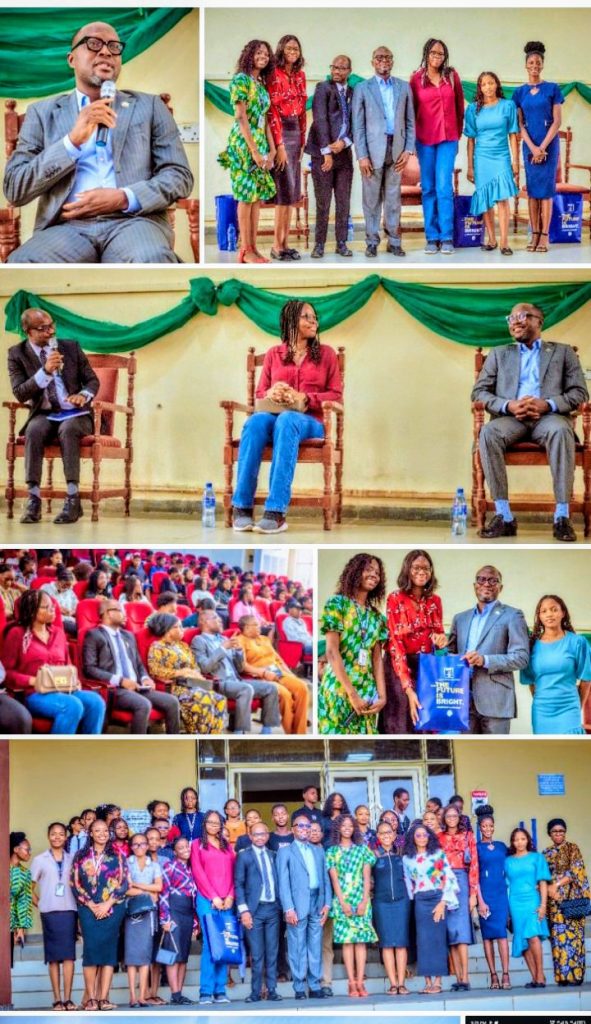
Managing Director/CEO of the Lagos Waste Management Authority (LAWMA), Dr. Muyiwa Gbadegesin, passionately championed the cause of “green justice” and environmental sustainability during a high-profile event titled “Sustaining the Planet, Upholding the Law: Green Justice in Action.” The event, held at Babcock University’s Law Campus in Iperu, gathered prominent advocates of sustainable practices, all united in their commitment to safeguarding the environment. Dr. Gbadegesin underscored the crucial intersection of legal frameworks and environmental preservation, emphasizing the need for proactive legal action in achieving a sustainable future. This gathering marked a pivotal moment for the LAWMA and its allies, sparking meaningful conversations on the role of law in driving eco-conscious change.
According to a press statement signed by the Director Public Affairs, Kadiri Folashade (Mrs.), it states that
Dr. Muyiwa Gbadegesin emphasized the economic potential of waste materials, urging a shift away from landfills toward recycling initiatives that can reduce environmental hazards. He highlighted LAWMA’s innovative solution to the pressing issue of waste management: the development of a cutting-edge waste-to-energy plant to replace the current landfill in Epe. The new facility will process 2,500 tons of waste daily, generating between 60 and 80 megawatts of electricity, marking a significant step toward both sustainable waste disposal and energy production.
Dr. Gbadegesin stressed the critical role of legislation in securing a sustainable future, citing recent actions taken by LAWMA to enforce environmental regulations. He pointed out that 50 residents were recently prosecuted in a mobile court for improper waste dumping, underscoring the authority’s firm stance on upholding the state’s environmental laws and its commitment to maintaining a cleaner, healthier environment.
Dr. Gbadegesin emphasized the need to align waste management practices with legal frameworks to foster effective legal partnerships. He outlined how LAWMA has strengthened its legal unit and improved public communication strategies to drive this integration. He concluded that robust legislation, supported by stringent enforcement, is crucial for securing a sustainable future
He postulated as thus, “The greatest challenge to sustainability lies in human behaviour. Whether it stems from a lack of knowledge or deeply ingrained attitudes towards waste management, we must continue to educate and enforce compliance to achieve our environmental goals”.
Dr. Gbadegesin detailed LAWMA’s comprehensive strategy for tackling waste management challenges, focusing on public education, strict enforcement, and active community engagement. He emphasized the crucial need for households to adopt proper waste practices, including owning bins, separating waste at the source, and using reusable bags, all of which play a vital role in promoting environmental sustainability.
Dr. Gbadegesin highlighted the significant role of LAWMA Academy in educating young minds on sustainable waste management. The academy actively engages with primary and secondary school students through regular visits, offering interactive learning experiences and outreach programs aimed at fostering environmental awareness and responsible waste practices among the next generation.
Kehinde Fadare, Sustainable Development Advisor at KPMG, contributed to the conversation by emphasizing the critical role of behavioral change in achieving sustainability objectives. He stressed that shifting mindsets and behaviors is key to driving long-term environmental impact and reaching sustainability goals.
Fadare asserted that achieving meaningful change in sustainability requires a fundamental shift in how individuals perceive waste. He emphasized that cultivating the right mindset would help shift the focus away from cost-related obstacles, making it easier to implement effective sustainability initiatives.
Fadare advocated for stronger public-private partnerships, highlighting that while government efforts are vital, collaboration with private sector players is crucial to harnessing collective strengths and driving sustainable outcomes.
Modupeoluwa Williams, Sustainability Consultant at Forvis Mazars on the other hand, highlighted shifting cultural behaviors as a key challenge in waste management, particularly in relation to changing consumption patterns. She emphasized that altering long-established habits is essential for more effective waste reduction and sustainability.
Williams pointed to the shift from reusable bottles to single-use plastic as a significant advancement that has come with serious environmental consequences. She urged the adoption of best practices for waste management, emphasizing the importance of reducing consumption, substituting harmful materials, recycling, and ensuring safe disposal to mitigate these impacts.
Building on the well-known “Reduce, Reuse, Recycle” framework, the panel proposed adding a fourth principle: “Refuse.” They urged individuals to actively reject products that contribute to environmental harm, emphasizing that this proactive approach would help prevent waste from accumulating at its source.
In conclusion however, the event also featured notable attendees, including Mrs. Folashade Kadiri, Head of Public Affairs at LAWMA, and Mrs. Bukola Adeyemo, Head of LAWMA’s Legal Unit, both of whom played key roles in the discussions and initiatives presented.
For waste management related issues and complaints, please call LAWMA toll-free numbers: 080000LAWMA (08000052962), 07080601020 and 617, or visit www.lawma.gov.ng.









